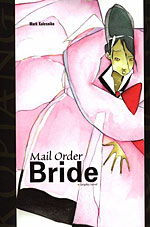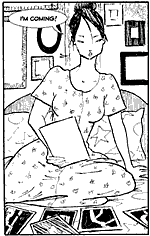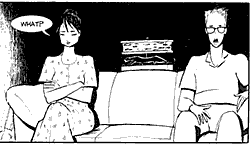
 Writer/Artist: Mark Kalesniko
Writer/Artist: Mark Kalesniko
Price: $19.95
Publisher: Fantagraphics Books
ISBN: 1560974109
The bride gets off the aeroplane to meet the man she has agreed to marry without ever meeting. She's from Korea, but has picked up English fairly easily, an achievement her future husband seems almost disappointed by.
He lives in a tiny little Canadian town, Bandini, where he runs a comic and toy shop whose contents spill over into his home. The bride's not exactly enamoured of all this, but he paid her way over here if she would marry him, and a promise is a promise.
Shortly after their wedding, they finally, awkwardly consummate their marriage, the husband too awkward to make the first move, the bride doing it half out of boredom, half out of a misguided sense of obligation. The husband, a man of thirty-nine, takes the opportunity to flee naked into the bathroom afterwards. "Thank you God," he is heard weeping from inside, "I'm not a virgin anymore!" The bride can only stare in disbelief. Everything's downhill from there.
Mark Kalesniko's MAIL ORDER BRIDE is the saga of these two people and their marriage, which, it soon becomes apparent, isn't going to end up like GREEN CARD.
Monty Wheeler, the husband, is a pathetic, overgrown man-child eager to have a beautiful Oriental woman to wait on him hand and foot, fulfilling all the lustful fantasies he's kept secret all these years. Kyung Seo, the bride is... well, she's not sure of that herself. She's not even sure what she wanted out of the marriage. But it sure as hell wasn't this.
 Time passes, depicted in a series of vignettes. The more Kyung learns about Monty, the less she likes him. Even though they speak the same language, they have nothing to talk about. Life in the tiny little burg consists of little more than wifely duties and listening to Monty's mother complain about her arthritis; Monty himself is only comfortable around older people, and his shop is patronised solely by loud children. Not exactly a life worth coming to another country for.
Time passes, depicted in a series of vignettes. The more Kyung learns about Monty, the less she likes him. Even though they speak the same language, they have nothing to talk about. Life in the tiny little burg consists of little more than wifely duties and listening to Monty's mother complain about her arthritis; Monty himself is only comfortable around older people, and his shop is patronised solely by loud children. Not exactly a life worth coming to another country for.
Kyung tries to make a life for herself, takes some classes at a local art school. In art, she discovers her own beauty and ability to express herself. She befriends her professor; will she have an affair with him? She makes another friend, Eve Wong, who's half-Chinese and as outspoken as Kyung is repressed. Eve doesn't mince words, especially when it comes to Kyung's pathetic husband. Kyung finds herself with a new role model, and Monty is beside himself. She tries to explain her interests, tries to involve him, but Monty wants his life on his terms and no one else's. He doesn't want a better life; he wants his toys, his comics and his mail order bride.
He's impossible, and Kyung realizes this; no way will her life with him ever improve. She responds by "liberating" herself, though at times her acts of liberation feel like cruelty; she's not even pretending to tolerate her husband, and seems to take outright pleasure in reminding him of what a pathetic little insect he is.
In the wrong hands, MAIL ORDER BRIDE would be 250+ pages in the company of two increasingly unpleasant people, but it's not as simple as that. More than just an examination of the realties of a mail order marriage, it's an exploration of the preconceptions people hold about others, and the pain that can result when people try to shape others to fit their own worldview. Maybe Kyung's unhappy in her marriage, but couldn't she just ask for a divorce? Monty may be a selfish twit, but is Kyung really angry at him for not fulfilling her expectations, just as he resents her for not fulfilling his? Eve talks trash about men, but does she believe what she's saying?
 As a reader, we form our own preconceptions about these characters as we observe them, but we're never privy to their innermost thoughts or feelings. We prejudge them just as they prejudge one another, and recoil when they behave in ways we didn't expect, leaving us to wonder if we're just as bad as they are.
As a reader, we form our own preconceptions about these characters as we observe them, but we're never privy to their innermost thoughts or feelings. We prejudge them just as they prejudge one another, and recoil when they behave in ways we didn't expect, leaving us to wonder if we're just as bad as they are.
Mark Kalesniko is a name previously unfamiliar to me; I'd seen his debut novel, WHY DID PETE DUEL KILL HIMSELF, but never got into it beyond a cursory flip. MAIL ORDER BRIDE is good enough that I want to give DUEL a second chance. Kalesniko's day job, according to the book's bio, is in animation, where he's worked on Disney films like THE LION KING and MULAN. His comic work tackles darker themes than either of those films, while retaining the fluid, image-rich style that characterises the best animation.
The majority of the book's pages employ a four-tiered format, cramming dozens of panels onto the page with a minimum of dialogue. This works in the story's favour; most of the time, the characters aren't bothering to say what they really think anyway. His characters are designed with just the right balance between realism and cartooniness, their features contorting as their defenses are stripped away.
He gets the details of the world of Bandini just right, capturing the sterile, claustrophobic nature of Monty's home to the cold, empty world outside. A number of styles are employed throughout the book, from photorealism to cartoonish conflict, from abstract fantasy to stark reality, but the transitions never feel jarring or confusing; they're all part of the same universe that makes up Monty and Kyung's world.
MAIL ORDER BRIDE is the perfect book to give to someone with preconceptions about... well, just about any kind of romantic ideal. Monty and Kyung may resent each other, but by the end, it's difficult to feel sorry for either of them. Their marriage resembles Sartre's version of Hell in NO EXIT; they're stuck together, but neither is willing to do what it takes to be free. Maybe it's not the life they wanted, but honestly, what did they expect?

This article is Ideological Freeware. The author grants permission for its reproduction and redistribution by private individuals on condition that the author and source of the article are clearly shown, no charge is made, and the whole article is reproduced intact, including this notice.


